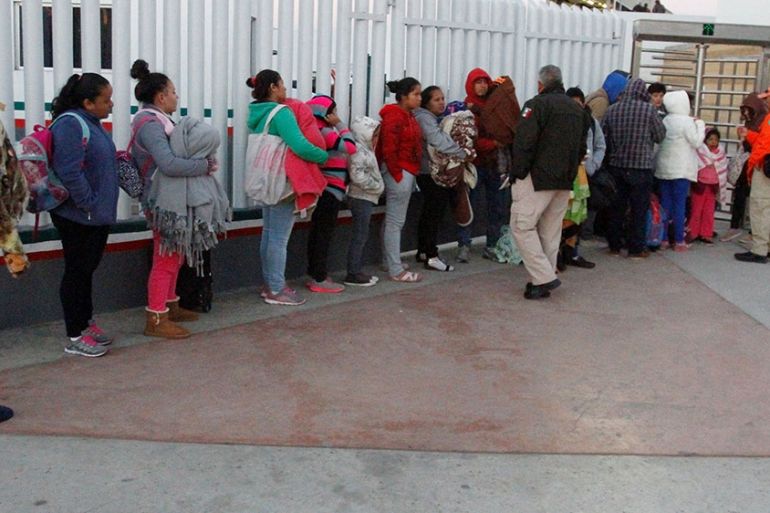Mexico slams US Supreme Court order on asylum restrictions
Mexican Foreign Minister Ebrard calls US court’s decision to allow for enforcement of new asylum rule ‘astonishing’.

Mexican Foreign Secretary Marcelo Ebrard said Thursday that Mexico’s government doesn’t agree with an “astonishing” US Supreme Court order that would block migrants from countries other than Mexico and Canada from applying for asylum at US borders.
Speaking at President Andres Manuel Lopez Obrador’s daily news conference, Ebrard said that Mexico has a different policy when it comes to asylum seekers and would never implement such a rule.
Keep reading
list of 4 itemsAdvocates gird for Texas migrant law that could upheave US immigration
US appeals court blocks Texas from arresting and deporting migrants
‘Incendiary and wrong’: Biden spurs anger for calling migrant ‘an illegal’
“Our policy of refuge, of asylum is a tradition in Mexico,” he said.
The US Supreme Court on Wednesday granted a request by the Trump administration to fully enforce a new rule that would curtail asylum applications by immigrants at the US-Mexico border.
The court said the rule, which requires most immigrants who want asylum to first seek safe haven in a third country through which they had travelled on their way to the United States, could go into effect as litigation challenging its legality continues.
“The United States has a very hardline immigration policy,” Ebrard continued. “The court’s decision is astonishing in the impact that it is going to have.”
Ebrard declined to explain that expected effects, saying that he had various meetings scheduled on Thursday to try to evaluate how Mexico will be affected. But the ruling is likely to drive more Central American migrants to try to irregularly enter the US with the help of smugglers or move them to apply for asylum in Mexico, which is already swamped with applications.
Mexico has long resisted a so-called safe third country agreement with the US that would require migrants to request asylum there first, but the court’s decision appears to have unilaterally brought about the same result.
On Thursday, Lopez Obrador said that he spoke by phone with President Donald Trump a day prior, noting the US president recognised Mexico’s efforts and relations between the two countries were very good.
He also said things were looking better for the ratification of a new free trade agreement between US, Mexico and Canada.
“There are no deep differences, there’s no discrepancy, nothing that could lead them to take measures or apply measures that affect the economy, the development of our country,” Lopez Obrador said. “On the contrary, there’s a very favourable environment for the United States Congress … unbeatable conditions to approve the free trade treaty.”
His conciliatory approach contrasts sharply with a line taken earlier this year by Trump, who tied immigration to economic policy by threatening crippling tariffs on all Mexican imports.
Following Trump’s threat, Mexico cracked down on migrants crossing the country, deployed the National Guard to the southern and northern borders, and tried to contain migrants to the southern part of the country.
It also accepted the expansion of the “Remain in Mexico” policy, under which the US has sent more than 40,000 asylum applicants back across the border to wait in Mexico.
Mexico faces criticism over policies at home
Mexico announced on Friday that it had reduced the flow of migrants arriving at its northern border by 56 percent in three months, and it has said that it’s beginning to invest in the Central American countries responsible for the majority of the migrants.
But leftist Lopez Obrador’s increasingly hardline immigration policies have attracted criticism at home and abroad.
United Nations High Commissioner for Human Rights Michelle Bachelet said this week she was concerned that immigration policies implemented in Mexico, the US and some Central American countries “are putting migrants at heightened risk of human rights violations and abuses”.
Asked about her comments Thursday, Ebrard said Mexico also had concerns and requested a meeting with her office to exchange information.
The foreign minister also explained that in return for its work on immigration, Mexico has asked the US government to help stem the tide of guns flowing into Mexico. The country currently has more murders than at any point in at least the past 20 years.
Ebrard said that 70 percent of the crimes committed with guns in Mexico between January and June involved guns purchased in the US.
“Mexico put on the table in this meeting that control of arms trafficking at the border for us is of the same priority ranking as the immigration issue is for them,” Ebrard said, referring to Tuesday talks. The two sides agreed to form a binational commission to track progress on the issue.
Ebrard said Mexico had proposed that the US begin operations at border crossings in San Diego, as well as the Texan cities of El Paso, Laredo, McAllen and Brownsville. He said 41 percent of the guns used in crimes and recovered in Mexico have been traced back to Texas. Mexico wants the US to do more to inspect whether vehicles leaving the country have guns and to investigate gun sales.
“Mexico’s objective would be to freeze arms traffic at the border,” he said. “For that, we need the participation of North American authorities.”